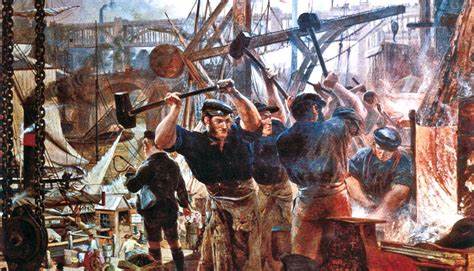The Unlikely Catalysts of the Industrial Revolution: Coffee and Boiled Water!
Introduction: Small Habits, Big Impact
The Industrial Revolution, beginning in the late 18th century, marked a turning point in human history. It transformed economies, industries, and societies, setting the stage for modern life.

Steam engines, coal, and mechanization are often highlighted as the revolution’s key drivers. Yet, two everyday practices the widespread adoption of coffee and the habit of boiling water also played surprisingly powerful roles. These simple changes boosted public health, sharpened mental focus, and created the conditions for innovation.
From Beer and Wine to Coffee: A Cultural Shift
Before the 1700s, water was often unsafe to drink. As a result, beer and wine were consumed daily, even by children, since fermentation killed harmful bacteria. But this reliance on alcohol created a sluggish, unfocused workforce.
Coffee’s arrival in Europe from the Middle East and Africa changed everything. Unlike alcohol, coffee sharpened the mind and energized the body. Workers stayed alert during long shifts, and intellectuals found a new tool for extended study and debate.
This shift away from alcohol helped create a more productive and creative society exactly what was needed as industrialization took hold.
Coffee and Productivity: Fuel for Industrial Work
Caffeine, the active stimulant in coffee, improved focus, reduced fatigue, and extended wakefulness. In factories and workshops, this meant workers could maintain energy levels and efficiency throughout the day.

For thinkers, inventors, and entrepreneurs, coffee promoted mental clarity and creativity. By sustaining concentration and productivity, coffee became one of the unseen engines of industrial progress.
Boiling Water: A Simple Solution to Deadly Problems
At the same time, the practice of boiling water spread widely. Until then, waterborne illnesses such as cholera, dysentery, and typhoid devastated communities. Alcohol provided a short-term substitute but came with its own problems.
Boiling water offered a safe, affordable solution. As disease rates declined, populations grew healthier, life expectancy increased, and labour became more reliable. With fewer illnesses and deaths, the workforce that powered factories and cities became stronger than ever.
Coffeehouses: Centres of Innovation and Exchange
Beyond physical productivity, coffee shaped society through coffeehouses. These venues became “penny universities” affordable spaces where people from all walks of life could meet, debate, and share ideas.
Philosophers, scientists, and entrepreneurs gathered in these hubs to discuss politics, economics, and technology. Thinkers like John Locke and Adam Smith found inspiration in such spaces, influencing the very ideas that underpinned modern democracy and capitalism.

Coffeehouses provided the social infrastructure where innovation could flourish, making them critical to the intellectual atmosphere of the Industrial Revolution.
The Industrialization of Coffee Brewing
Ironically, coffee itself became a product of industrial progress. Early preparation methods were slow and manual: beans roasted over open flames, ground by hand, and brewed one cup at a time.
With industrial advancements, coffee production was revolutionized. Steam-powered grinders, mass-production roasters, percolators, and urns made coffee faster, more consistent, and accessible on a large scale. Factories began offering coffee to workers, ensuring energy and focus across long shifts.
This evolution mirrored the very principles of the Industrial Revolution: efficiency, productivity, and innovation applied to everyday life.
Coffee on the Move: Meeting Industrial Demands
As industrial life grew more demanding, portable brewing solutions like vacuum brewers allowed workers to carry coffee with them. This mobility made coffee more adaptable to the fast-paced industrial world, embedding it deeply into daily routines.

Coffee Travel Guide: Best Cafés and Roasters Around the World.
For coffee lovers, exploring the world often means discovering unique cafés and specialty roasters. From local hidden gems to famous…

Sustainable Coffee: How to Drink Responsibly.
Sustainable Coffee: How to Drink Responsibly. Introduction Sustainable coffee isn’t just a trend it’s a movement that supports farmers, protects the environment,…
Coffee Storage Tips: Keeping Beans Fresh and Flavourful.
Coffee Storage Tips: Keeping Beans Fresh and Flavourful. Introduction Fresh coffee starts with proper storage. Even high-quality beans lose flavour and aroma…
Specialty Coffee Drinks: Lattes, Cortados, and More Explained.
Coffee culture isn’t just about black coffee it’s also about specialty drinks that combine espresso, milk, foam, and ………………. Read…
Coffee and Sleep: How to Enjoy Your Brew Without Insomnia.
Coffee can be a lifesaver in the morning, but drinking it at the wrong time can disrupt sleep and impact…
Healthy Coffee Habits: Enjoy Your Brew Without the Guilt.
Healthy Coffee Habits: Enjoy Your Brew Without the Guilt Introduction Coffee can be one of life’s greatest pleasures, but many people worry…
Conclusion: Everyday Catalysts of a Global Transformation
The Industrial Revolution was powered by engines, factories, and steel but it was also fuelled by coffee and boiled water. Coffee sharpened minds and sustained energy, while boiling water improved health and reduced disease. Together, they created a stronger, more productive workforce and an environment ripe for innovation.

Coffeehouses became breeding grounds for revolutionary ideas, while industrial technology transformed how coffee itself was produced and consumed.
These simple daily habits may seem ordinary, but they shaped history in extraordinary ways. Their legacy remains with us today, as coffee continues to energize modern life a living reminder of how small changes can drive great transformations.

Author.
Brendon McAliece is a multi-lingual expat with a diverse range of passions, including an expert knowledge of coffee.

Brendon’s love for coffee extends beyond just drinking it a passion that he integrates into his daily life, exploring new brews, coffee cultures, and techniques wherever he goes.
Whether traveling, working with cutting-edge technology, or playing guitar, Brendon’s life revolves around his passions, and coffee is always by his side.
You can read more about his adventures, both in the skies and in the world of coffee, in his blogs below.
Learn more @
DreamingGuitar.com – DreamingCoffee.com – LetsFlyVFR.com
Home – Blog – Shop – About
Dreaming Coffee Highlights
- Popular Coffee Drinks Worldwide
- The Significance and Allure of the Coffee House
- Long Black vs Short Black
- Coffee vs Espresso – Which is Best?
- How to Make Vienna Coffee!
- Authentic Thai Coffee Recipe
As an Amazon affiliate I may earn on qualifying sales.







